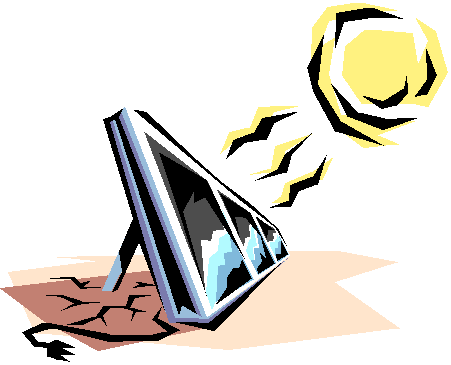|







| |
Solar System Maintenance Recommendations
ecosystems
is very experienced in solving existing problems and reducing potential
problems. See our troubleshooting section under "services" if you would like help
diagnosing a current problem.
Like any mechanical device, it is most beneficial to properly maintain your
pool
solar system to avoid problems. These are some suggestions:
- Drain panels and solar piping every fall to avoid freeze-related panel
and pipe damage. Remember,
FAFCO panels designed for above
ground pools need to be removed and stored in a non-freezing location whenever
potential freezing can occur.
- If any solar pool
panel does develop a leak, there is generally a way to solve it, depending on the
manufacturer, without having to replace it. For example,
FAFCO has a simple
repair kit that permanently seals the damaged tube using small plugs. Some
other panels can use these too, but there may be other recommended procedures
better suited for specific panels.
- Check panels for flow. When the panels are operating, they
should be COOL to the touch indicating all the heat is transferred to
the water flowing through it.
- Tighten clamps or other panel connections every couple of years or so to avoid
leaks or panel separation.
- With FAFCO panels it is virtually
impossible for the panels to separate due to the "spin weld" at the panel
header termination and their Female Adapter used at every panel/PVC pipe
connection.
- Resecure panel strapping as needed to:
- reduce wind-load stress and wear on panels that might otherwise abrade
against the surface to which they are mounted.
- reseal any roof penetrations made by screws or bolts that could eventually
cause a roof leak.
- If properly installed, lag bolts used to secure the panels should not come
loose in normal operation.
- Paint all PVC piping exposed to sunlight to reduce UV
(ultra-violet radiation) degradation. Over time, the pipe will get
brittle and crack if left unprotected.
- Inspect and repair control sensor wire and spices to ensure no
wires are exposed or corroded. Test for continuity with an ohmmeter
(see sensors). Check every five years.
- Inspect sensors to see if they are water-tight and functional.
If you have an ohmmeter, check them for resistance. Depending on the
control manufacturer, these resistances will read about 5K (5000) or 10K (10,000) ohms at
74o F or 25o C . Resistance decreases with increased temperature.
- Click here for a
10K
chart for specific temperatures vs. resistance readings
given the control manufacturer. Check as needed if control seems not to
be working properly.
- Maintain a clean, free-flowing circulation system. Clean you pump's
leaf trap and backwash your filter frequently. Check to make sure
there are no flow restrictions in the piping, valves, pump, filter, and
panels.
- DE (diatomaceous earth) filters are most susceptible to problems.
This earth medium is so fine that even a very small tear in the filter grid
can allow it to escape into pool and, unfortunately, into panels as well.
The sub-manifolds of our panels and others can easily be clogged by DE.
To clear it out, they need to be back-flushed. You can check for this by
feeling the panel; if it's warm during operation, it's clogged!
- DE filters also need a functioning check valve downstream so water coming
out of the panels after the pump shuts off will not back-flow the filter and
push the DE back into the pool through the skimmers and maindrain. If
you see a fine sandy material in either location this check valve may be bad.
- If you don't have a control system installed, we recommend you do so.
Controls can increase performance 20% or more.
Copyright © 2001
ecosystems. All rights reserved.
Page last updated:
August 18, 2015
|

